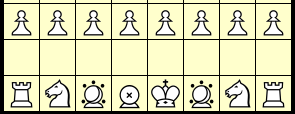[ List Earliest Comments Only For Pages | Games | Rated Pages | Rated Games | Subjects of Discussion ]
Comments/Ratings for a Single Item
I think the best approach may depend on how many different pieces and movement types you use. One idea may be to use adjectives that are mnemonic. For instance, I am playtesting an unpublished variant of Falcon Chess with Peter Aronson in which the Falcon move is combined with other powers. When an otherwise normal piece also has the Falcon move, the adjective 'winged' is added to its name. If there were no more than four things combined together, a 'Winged Roving Leaping Whatever' might be easier to remember. Ralph Betza has taken the approach, in some variants, of trying to arbitrarily arrange his funny notation to be pronouncable, with mixed results. Similarly, you could assign an open syllable to each combining part, and form nonsense words that would at least be precise and pronouncable. So a 'Winged Roving Leaping Whatever' might be a 'WheeRoLee Whatever' or a 'WheeRoLeeWha'.
 Robert Shimmin wrote on Thu, Jul 10, 2003 01:03 AM EDT:
Robert Shimmin wrote on Thu, Jul 10, 2003 01:03 AM EDT:When talking about piece names, I think it's important to separate naming a piece for including it in a game vs. naming a piece for talking about the theory of pieces. In a game, the piece should probably be named to fit the feel of the game, if it has a theme, or otherwise establish something logical sounding that helps compare the piece to pieces with well-known names. (I had a partial game that included a straight+crooked bishop and called it the inquisitor; the idea was later scrapped because it's hard to use a superqueen-class piece that's still colorbound, but I digress.) The battle to keep the same names for the same piece between games was lost before it began, and isn't particularly important anyway. The best names are both aesthetic and mnemonic. When talking about the theory of pieces, the name is unimportant, because most of the time you'll end up using a shorthand notation anyway.
3 comments displayed
Permalink to the exact comments currently displayed.
